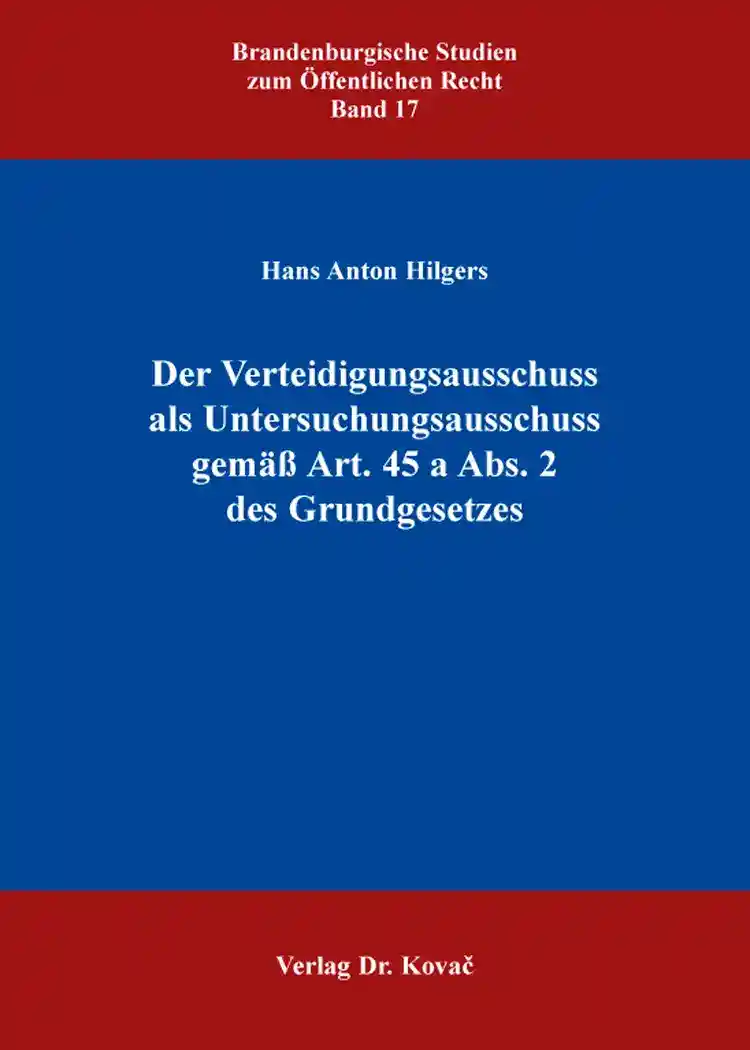Hans Anton HilgersDer Verteidigungsausschuss als Untersuchungsausschuss gemäß Art. 45 a Abs. 2 des Grundgesetzes
Brandenburgische Studien zum Öffentlichen Recht, volume 17
Hamburg 2015, 438 pages
ISBN 978-3-8300-8346-7 (print) |ISBN 978-3-339-08346-3 (eBook)
Rezension
[...] Hilgers‘ Arbeit nimmt in grundlegender Weise ein Thema auf, das in der Literatur zum Untersuchungsrecht des Bundestages nur wenig Aufmerksamkeit gefunden hat.
[...] Ein wesentlicher Vorzug der Monographie von Hilgers liegt darin, dass das juristisch und politisch schwierige und unter Umständen folgenreiche Verfahren einer Untersuchung durch den Verteidigungsausschuss nicht nur als solches, sondern auch regelmäßig mit Blick auf das Verhältnis zwischen allgemeinen Untersuchungen des Bundestages und solchen seines Verteidigungsausschusses betrachtet wird.
[...] Angesichts der vielen [...] Beschreibungen des Verfahrens des Verteidigungsausschusses ist seine Arbeit zudem als Handbuch für alle mit der Materie Befassten zu empfehlen.
About this book deutschenglish
The focus of this publication is on issues regarding the definition of Art. 44, 45a of the basic constitutional law (Grundgesetz – GG), the rules of procedure and the parliamentary investigation law. Thereby it is a special contribution to the law of the investigation committee as a whole.
The author comes to the conclusion that, from today’s perspective, the interpretation of Article 45a GG needs to be carried out on the basis of the objective view of the legislator. New historic research results, the parliamentary predecessors of the Defence Committee and the legislative process of the army constitution (Wehrverfassung) reveals that the legislative history provides only limited insight for the interpretation of Art. 45a GG.
In particular, the essay describes the dogmatic distinction between the Defence Committee as an expert committee on the one hand and an investigative committee on the other hand, as suggested by the constitution. While its area of operation as an expert committee is broad, a systematic and teleological interpretation comes to the conclusion that the ‘sharp sword’ of the right of investigation should be limited to the armed forces. These findings are supported by the system of the army constitution as a whole, which provides various instruments and degrees for the exercise of parliamentary control.
In a detailed way, this essay addresses the non-public nature of the meetings of the Defence Committee, including the protection of confidentiality (Geheimschutz). As a result, it is noted that this only grants relative protection against the general public. It cannot be derived from Art. 45a GG that the hearing of evidence needs to be carried out non-publicly a matter of principle.
The author takes a special interest in answering the question how ancillary bodies can support the Defence Committee in carrying out its investigative tasks. In addition to the appointment of subcommittees and an investigation officer, the author especially recommends to resort for this purpose to the Parliamentary Commissioner for the Armed Forces (Wehrbeauftragter).
Keywords
EinsetzungGrundgesetzParlamentarische KontrolleParlamentsrechtRechtswissenschaftUntersuchungsausschussUntersuchungsverfahrenVerfassungsmäßigkeitVerteidigungsausschussIhr Werk im Verlag Dr. Kovač

Möchten Sie Ihre wissenschaftliche Arbeit publizieren? Erfahren Sie mehr über unsere günstigen Konditionen und unseren Service für Autorinnen und Autoren.
